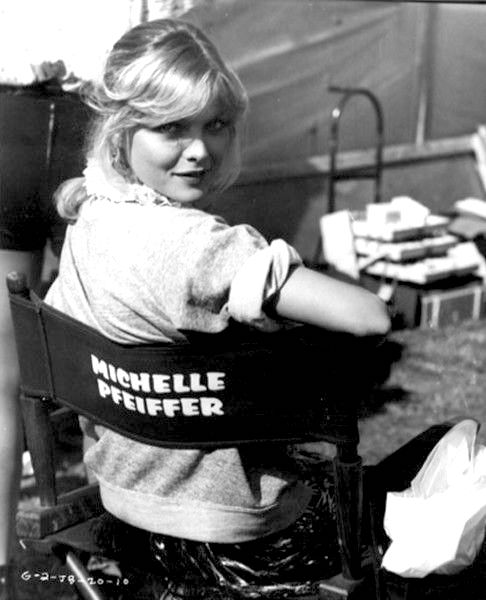 on the set of Grease 2, her first lead roleP F A N D O M
on the set of Grease 2, her first lead roleP F A N D O M
Michelle Pfeiffer Retrospective. Episode 8
by Nathaniel R
We've mostly focused on Michelle Pfeiffer's acting in our Pfandom retrospective. We're sure the star who has described herself as "extremely private" would like it that way, but this would be the appropriate time for a brief bit of personal context.
Though the young actress had been working nonstop since the late 70s in television roles and a few features, she'd been struggling offscreen. She was impatient with the way her career was developing. She'd also become involved with a cult, an experience she's always been cagey about in interviews. She had given them too much of her money and was eating strangely at their insistence. In 1981, she took back control of her life.
 At the Grease 2 premiere in NYC with her new husband Peter Horton and producer Allan Carr
At the Grease 2 premiere in NYC with her new husband Peter Horton and producer Allan Carr
Two marriages and two divorces (of sorts): in her personal life she fell in love with fellow up-and-coming actor Peter Horton (who would later become a TV star on thirtysomething), and broke free from the cult; in her professional life she dumped her first agent to sign with the much more powerful William Morris Agency. The shakeup had an immediate effect on her career...
On her honeymoon, she learned she'd won the lead role in Grease 2 despite being the least famous of the finalists; New rock star Pat Benatar, Broadway's original "Annie" Andrea McArdle, and young TV stars Kristy McNicol and Lisa Hartman had also been in the running for the sequel to one of Hollywood's all time biggest hits*
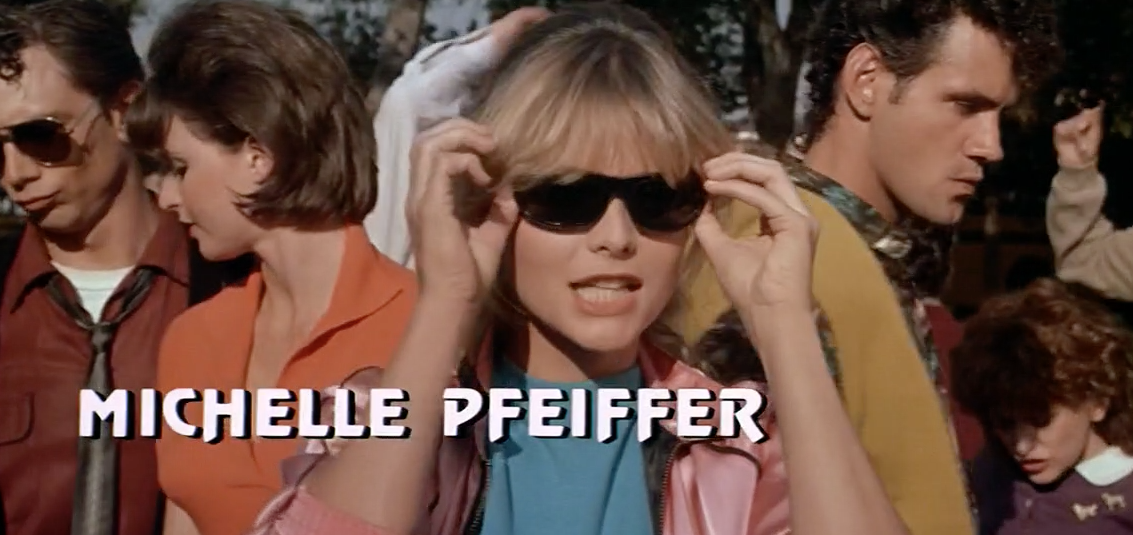
Grease 2 (1982)
Pfeiffer enters her intended star-making vehicle in a broadly cartoonish way shimmying, strutting, swinging her arms around, singing the Pink Girls chant during "Back to School," her dark shades setting her apart from the crowd (as they also will in the "Let's Score" number). In subsequent group numbers she has this flexible way of being both inside and outside of the dancing, sometimes deeply committed to the choreography, other times taking a moment to jump in. The takeaway feeling is always 'too cool for school,' and, luckily for Pfeiffer, too cool for this movie.
Which is not to say that this big break into leading lady status is one of her finest performances. Sometimes she leans too far into a high pitched whine (she'll develop much more range with her speaking voice later on) and nothing is delivered with any subtlety. Not that a lot of subtext and nuance would be the right choice for this picture.
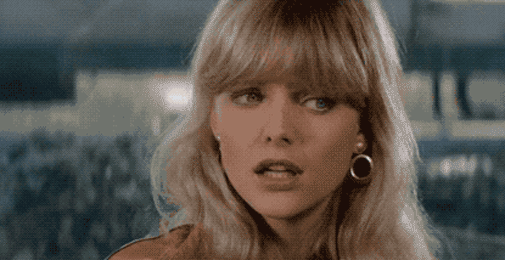
Don't you think that's kind of weird? Not like weird weird, but exciting weird.
Still, she lays on the sass and tough girl shtick and everything really extra thick. As thick as she likes the ketchup on her burger as we discover in her single most endearing scene as Stephanie gets some after-school tutoring from Michael (Maxwell Caulfield) about Shakespeare. She doesn't know that he's her dream man, her "cool rider" as it were.
Just how much of an actor's personal life bleeds into their screen life is a question with only speculative answers across a wide spectrum. But Pfeiffer's Stephanie Zinone sure feels like a role she could only have played right then and there. It's not much of a stretch to imagine that the impatient actress, who had been frequently employed from the start but still felt like nothing was happening, would relate to the there-but-not-there feeling that the dissatisfied Zinone exudes.
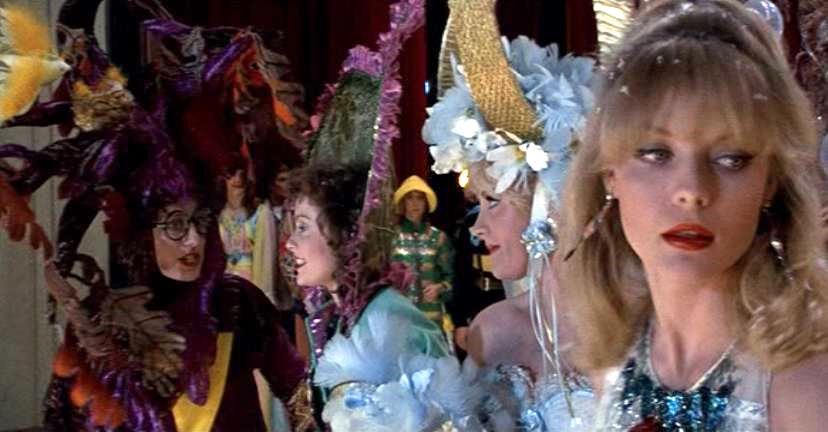
In the long final act of the movie, this feeling is literalized in one super kitschy sequence which kicks off with the comic "Girl for All Seasons" number, before drifting off into a morose Stephanie/Michael dream sequence "(Love Will) Turn Back the Hands of Time".
Underneath Pfeiffer's inestimable beauty, physical comedy, nd snarky quips, there's a surprisingly moving undercurrent of hazy yearning. She wants a different life and new experiences -- she's longing for something else. What that was maybe the actress herself didn't yet know. Stephanie Zinone certainly didn't though she's ultra specific about what she imagines it to be in the movie's justifiably famous and best number, "Cool Rider".
For this one brief shining moment, Pfeiffer slays so completely that you're forgetting you're even watching a cash grab sequel. She's utterly magnetic, eyes popping, mouth open, ready to pounce. This is stardom; her inner life comes roaring to life, until you're totally inside her point of view, caught up in that 'devil in skin tight leather' fantasy as if it's your own.
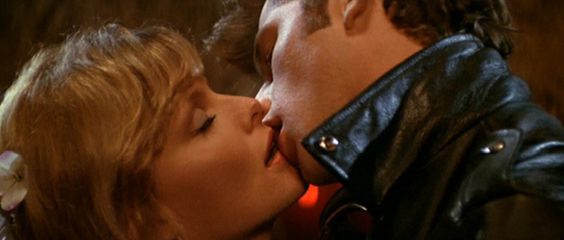
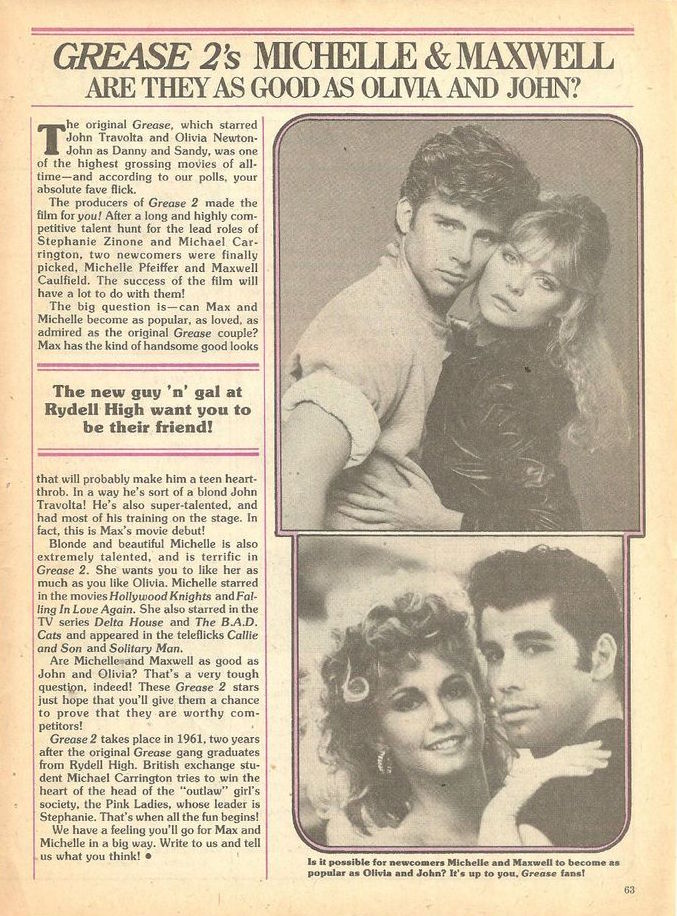 a typical teen mag article at the time
a typical teen mag article at the time Maxwell and Michelle at the premiere
Maxwell and Michelle at the premiere
The Fallout
Grease 2's status as a 'Bad Movie We Love,' its fans now legion, was not evident back in 1982. Though Pfeiffer proved she could carry a picture, the knives were out for the film. There was gossip that she and Maxwell Caulfield had never clicked (to put it mildly). Grease 2 opened to hostility from critics and relative disinterest by the public, despite much pre-release hoopla.
For her part Pfeiffer has always seemed slightly embarrassed by Grease 2 and hated the celebrity portion of promoting it. (That aversion to the very public nature of her career was not something she'd ever get over when mega-fame did arrive but that was in the future.)
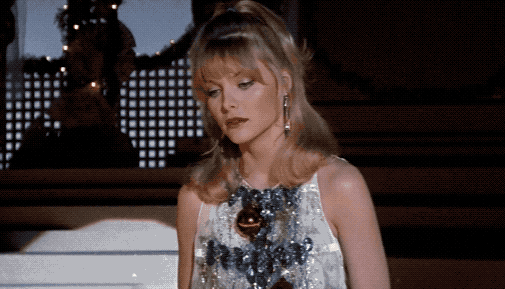
Overnight stardom didn't materialize in 1982 as the hype had promised. Though the tomatoes being thrown were largely aimed at director Patricia Birch and leading man Maxwell Caulfield, bombs have blast radiuses. Pfeiffer's heat cooled. Offers did come in but they were for similar tough chick types. Discouraged, she turned them down.
How long would she have to wait for something great?

LOTS MORE ON GREASE 2 IF YOU LOVE IT
Last Week: Charlie Chan and the Curse of the Dragon Queen (1981)
Next Week: Scarface (1983)
* These details about the casting of Grease 2 come from the book "Pfeiffer: Beyond the Age of Innocence"